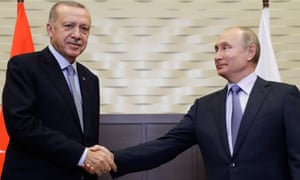Turkey and Russia agree deal over buffer zone in northern Syria

The Turkish president, Recep Tayyip Erdoğan, and his Russian counterpart, Vladimir Putin, have agreed on the parameters of a proposed Turkish “safe zone” in Syria, a development that could bring an end to Ankara’s offensive against Kurdish forces over the border by severely curtailing their control of the area.
The two leaders were locked in marathon talks for more than six hours in the Russian Black Sea city of Sochi, emerging just two hours before a five-day ceasefire brokered by the US expired at 10pm local time.
Erdoğan hailed the deal as “a historic agreement” while addressing reporters alongside Putin.
“According to this agreement, Turkey and Russia will not allow any separatist agenda on Syrian territory,” he said.
Tuesday’s developments more concretely define the size and scope of the area that Turkish soldiers will occupy, adding to pockets of northern Syria that Turkey seized from Islamic State and Kurdish fighters in operations in 2016 and 2018.
The deal was widely perceived as good news for Ankara and a poor result for the Kurdish-led Syrian Democratic Forces (SDF), building as it does on the US’ agreement last week that Turkey has a right to a buffer zone on its border at their expense. It also cements Moscow’s new role as prime powerbroker in the Middle East as US influence in the region wanes.
Turkish troops in areas of north-east Syria seized since the start of the 9 October offensive will remain in situ, and Russian troops and the Syrian army will control the rest of the frontier, effectively fulfilling the goal of Turkey’s Operation Peace Spring: the dilution of Kurdish control over the 270-mile (440km) border corridor.
Russian military police and Syrian border guards controlled by President Bashar al-Assad will from Wednesday at noon facilitate the removal of SDF fighters and weaponry to the depth of 18 miles from their positions on the border, the Turkish foreign minister, Mevlüt Çavuşoğlu, and his Russian counterpart, Sergei Lavrov, said after their respective presidents announced the agreement to reporters.
The SDF has 150 hours to withdraw, a joint statement said, and then Turkish and Russian soldiers will begin joint patrols of the entire border area to a depth of 10km with the exception of the de-facto Kurdish capital, Qamishli. The deal appears to also include the contested strategically key town of Manbij as well as the important Kurdish town Kobane. It made no mention of the long-term presence of troops loyal to Assad, now also present in the proposed border zone.
No comment on the deal from the SDF or Kurdish political leaders was immediately forthcoming. The umbrella force’s commander-in-chief, Mazloum Kobane, confirmed earlier on Tuesday that his fighters had withdrawn from the border strip between Tal Abyad and Ras al-Ayn, the two towns bearing the brunt of the Turkish attack, hours before the poorly observed US-brokered ceasefire ended.
The chain of events triggered by Donald Trump’s 6 October announcement that US troops would leave Kurdish-controlled north-east Syria has left Moscow the most powerful player in Syria’s complex war, now in its ninth year.
Turkish troops, allied Syrian rebel proxies, the SDF, and soldiers belonging to Assad are now all present in the border zone, with Russia the only negotiating force between them.
Trump has been widely criticised for his decision to pull back the remaining 1,000 US special forces from the region, which in effect greenlit the Turkish attack on the SDF, the US’s ground partner in the five-year-campaign to defeat Isis. Ankara, however, has long maintained the main Kurdish unit in the SDF is indistinguishable from the outlawed Kurdistan Workers’ party (PKK).
As a result of the Turkish offensive, Syria’s Kurdish officials struck a deal with Assad, their former enemy, for military reinforcements in the border area.
Ankara will be pleased that Moscow has persuaded Damascus to cede it control over more territory in the north-east, breaking up Kurdish control. In return, Moscow appears to have extracted commitments from the Turkish delegation that Turkey will respect Syria’s sovereignty and territorial integrity.
Assad himself has repeatedly vowed to reunite his entire country under Damascus’s rule. In a symbolic visit to the north-western province of Idlib on Tuesday – territory the regime now occupies for the first time in years – he called Erdoğan “a thief” and said he was ready to support any popular resistance against Turkey’s invasion.
“We are in the middle of a battle and the right thing to do is to rally efforts to lessen the damages from the invasion and to expel the invader sooner or later,” he told troops, adding that Kurdish fighters would be granted an amnesty if they returned to the fold of the Syrian government.
At least 120 civilians in Syria and 20 in Turkey have died as a result of the almost two-week old assault, with 176,000 Syrians displaced by the violence, the UN said on Tuesday. Intermittent fighting has continued despite a US-brokered ceasefire announced by Mike Pence, the American vice-president, on a visit to Ankara last Thursday.
Last week’s US-Turkish agreement did not specify the zone’s size, where Turkey also plans to repatriate up to 2 million of its 3.6 million Syrian refugee population.
Previous agreements between Washington and Ankara over a safe zone along the Syria-Turkish border floundered time and again over diverging definitions of the area.





.jpeg)
Comments
Post a Comment